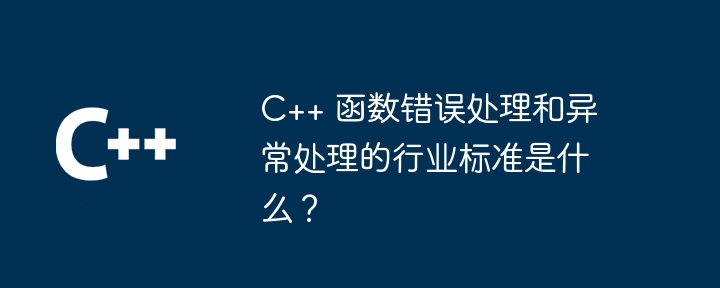C++ 函数错误处理和异常处理的行业标准是什么?
- 王林原创
- 2024-04-23 22:06:021051浏览
行业标准规定使用 errno 变量和异常处理来处理函数错误和异常。函数错误处理:使用 errno 跟踪错误,perror() 打印消息,strerror() 转换为字符串。异常处理:try-catch 捕获异常,throw 触发异常,catch 子句处理特定类型的异常。

C 函数错误处理和异常处理的行业标准
在 C 中处理函数错误和异常是软件开发中的关键实践,有助于创建健壮且可靠的程序。行业标准为这些处理机制制定了最佳实践,确保代码的可维护性和鲁棒性。
函数错误处理
- errno 变量:存储系统或库函数调用时发生的错误代码。
- perror() 函数:打印由 errno 表示的错误消息。
- strerror() 函数:将 errno 代码转换为字符串消息。
异常处理
- try-catch 语句:用于捕获并处理异常。
- throw 关键字:引发异常。
- catch 子句:特定类型异常的处理程序。
实战案例
考虑以下示例函数,它从文件中读取并打印其内容:
#include <iostream>
#include <fstream>
using namespace std;
void readFile(const string& filename) {
ifstream file(filename);
if (file.fail()) {
perror("Error opening file");
return;
}
string line;
while (getline(file, line)) {
cout << line << endl;
}
if (file.bad()) {
throw runtime_error("Error reading file");
}
}错误处理:
- 函数使用
if (file.fail())检查文件是否无法打开。如果无法打开,它打印错误消息并返回。
异常处理:
- 在
getline()循环内部,函数检查file.bad()以检测任何读取错误。如果检测到错误,它会引发runtime_error异常。 - 在调用函数的地方,可以在
try-catch块中捕获异常并采取适当的操作:
try {
readFile("non-existent-file.txt");
} catch (const runtime_error& e) {
cout << "Error reading file: " << e.what() << endl;
}最佳实践
遵循以下最佳实践以进行有效的函数错误处理和异常处理:
- 一致地使用标准机制(
errno、异常)。 - 清楚地记录错误消息和异常描述。
- 使用详细的错误代码来识别特定错误。
- 在适当的时候,使用异常来表示严重错误。
- 对捕获到的异常进行适当的处理。
以上是C++ 函数错误处理和异常处理的行业标准是什么?的详细内容。更多信息请关注PHP中文网其他相关文章!
声明:
本文内容由网友自发贡献,版权归原作者所有,本站不承担相应法律责任。如您发现有涉嫌抄袭侵权的内容,请联系admin@php.cn

